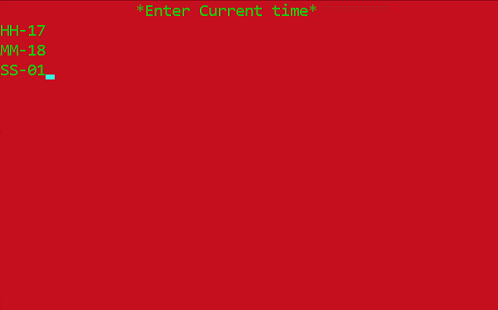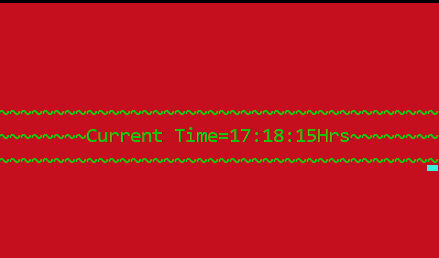Digital Clock starting from user set time in C++
Last Updated :
25 Mar, 2021
In this article, we will discuss the Digital Clock in C++ Language. It is an application that allows for a personal clock that starts at a custom set time and shows the time from that point onwards. This article describes how to make such a clock in a 24-hour format with HH:MM:SS slots and start the time from where one would want it to be, and then it moves forward from there.
Features: It is a Simple Digital clock developed using basic C++ concepts that shows hour, minute, and second.
Approach: The requirements for this program are just the basic concepts of the data types, variables, manipulators, Control statements, Conditional statements, etc. Below are the steps:
- Create a screen that will show “Current time” of your location which will be implemented using simple output methods used in C++ i.e., cout, and a manipulator “setw()“.
- In the fore mentioned screen, implement the HH column, MM column, SS column, that will contain the time.
- Implement colors using System(“color 4A”), the color will be in hexadecimal format and the console can be used to implement them using double-digit hex codes (0 to F) which will, in turn, change the text color in the console of the output.
- In the last screen, a digital clock can be seen finally implemented and running from the inputted time.
Functions Used:
- System(“cls”): It is used to clear the Console or the Screen. It can be avoided if anyone wants to see whatever is appearing on the screen.
- setw(): This function is used to leave the space of particular characters that you can write in the parenthesis. It is declared in <iomanip> header file. Here setw(70) is used.
- System(“color 4A”): This function is used to make background RED and text as LIGHT GREEN.
- Sleep(): sleep is a function that is declared in <windows.h> header file. It actually suspends the execution of the program temporarily for a period of time in milliseconds.
Below is the implementation of the above approach:
C++
#include <iomanip>
#include <iostream>
#include <stdlib.h>
#include <windows.h>
using namespace std;
int main()
{
system("color 4A");
int hour, min, sec;
cout << setw(70)
<< "*Enter Current time*\n";
cout << "HH- ";
cin >> hour;
cout << "MM- ";
cin >> min;
cout << "SS- ";
cin >> sec;
system("color 4A");
if (hour > 23) {
cout << "Wrong Time input";
}
else if (min > 60) {
cout << "Wrong Time Input";
}
else if (sec > 60) {
cout << "Wrong Time Input";
}
else {
while (1)
{
system("cls");
for (hour; hour < 24; hour++) {
for (min; min < 60; min++) {
for (sec; sec < 60; sec++) {
system("cls");
cout << "\n\n\n\n~~~~~~~~~"
"~~~~~~~~~~~~~~~~~~~~~"
"~~~~~~~~~~~~~~~~~~"
"Current Time = "
<< hour << ":" << min << ":"
<< sec
<< "Hrs~~~~~~~~~~~~~~~~~~"
"~~~~~~~~~~~~~~~~~~~~~"
"~~~~~~~~~";
Sleep(1000);
}
sec = 0;
}
min = 0;
}
}
}
}
|
Input:

Output:

Share your thoughts in the comments
Please Login to comment...